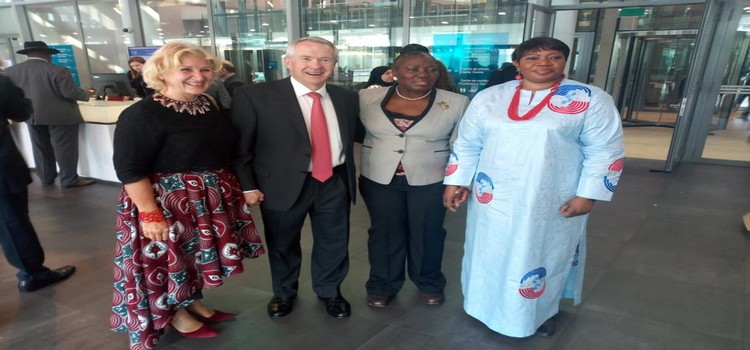While at the commemoration of the 20 years of the Rome Statute in Netherlands, the speaker of parliament Rebecca Kadaga reassured that Uganda had no intentions of leaving the International Criminal Court.

Speaker Rebecca Kadaga in the Netherlands: PHOTO FROM PARLIAMENT WEBSITE
“I want to begin by reassuring the President [of the ICC] that Uganda will not withdraw from the Rome Statute but we will continue working together,” said Kadaga
In the Heads of State Summit in Addis Ababa February 2017, Uganda voted in favour of the African Union decision to withdraw from the ICC after a motion was instated by Kenya was debated by heads of state.
“Of course, we are part of the African Union and there have sometimes been difficult situations between the ICC and the African Union. There are areas of reservation,” said Kadaga said.

President Museveni meets President of Gabon Ali Bongo on arrival in Addis – 28th AU Ordinary Summit PHOTO FROM MINISTRY OF FOREIGN AFFAIRS WEBSITE
Uganda has received heavy criticism from the ICC for collaborating with Sudanese President Omar Bashir, who has cases to answer in the court on allegations of stirring the war crimes and crimes against humanity committed in Darfur.
However, Kadaga defended Uganda’s actions describing Bashir as “an important actor” in the region, stressing his efforts and centrality in prospects for peace in the war torn and volatile South Sudan.
Khartoum and Kampala, previously at diplomatic crossroads, are now working to facilitate the recent shaky peace deal between former Vice President Riek Machar and President Salva Kiir led forces.
Kadaga said Uganda stands for a position where “justice is not sacrificed at the altar of peace, and peace is not sacrificed at the altar of justice”.
ICC has become unpopular over its actions of targeting only African states the claim the court persistently deny. It therefore appointed Fatou Bom Bensouda of Gambia as International Criminal Court‘s chief prosecutor so as to give it an African face.
Burundi and South Africa have formally petitioned to withdraw from the ICC although they have not yet officially left.
Speaker has urged the Court to consider the citizenship of children born during conflicts which cut across regions saying that women abducted by rebels and moved to areas away from their home have children with no identity.
“There is a fundamental problem; for instance a rebel grabs a woman in Congo, takes her to the Central African Republic, and has a child there. Neither of the parents is a citizen of CAR; there are no birth certificates then they move to a third country. Where does that child belong?” Kadaga pondered.
READ ALSO:
2017 Annual Crime report: crimes against persons dominate
Indian Prime Minister to address Parliament
